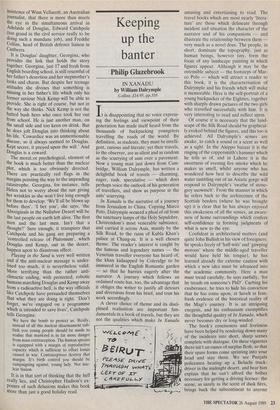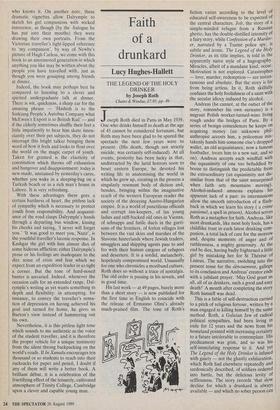Keeping up the banter
Philip Glazeb rook
IN XANADU by William Dalrymple E14.95, pp.310 It is disappointing that no voice express- ing the feelings and viewpoint of their generation has made itself heard from the thousands of backpacking youngsters travelling the roads of the world. By definition, as students, they must be intelli- gent, curious and literate; yet their travels, to the observer, are as silent and as random as the scurrying of ants over a pavement. Now a young man just down from Cam- bridge, William Dalrymple, has written a delightful book of travels — charming, eager, rash, speculative — which does perhaps voice the outlook of his generation of travellers, and show us purpose in the ants' scurrying.
In Xanadu is the narrative of a jOurney from Jerusalem to China. Copying Marco Polo, Dalrymple secured a phial of oil from the sanctuary lamps of the Holy Sepulchre, Christendom's most venerable substance, and carried it across Asia, mainly by the Silk Road, to the ruins of Kubla Khan's palace at Chang-zu. It is a well chosen theme. The reader's interest is caught by the famous and legendary names — the Venetian traveller everyone has heard of, the khan kidnapped by Coleridge to be immured in the English Romantic garden — so that he hurries eagerly after the narrator. A journey which follows an ordained route has, too, the advantage that it obliges the writer to justify all detours and diversions from his brief, and trim his work accordingly.
A clever choice of theme and its disci- plined realisation are important fun- damentals in a book of travels, but they are not the qualities which make In Xanadu amusing and entertaining to read. The travel books which are most nearly 'litera- ture' are those which delineate through incident and situation the character of the narrator and of his companions — and illustrate the relationship between them — very much as a novel does. The people, in short, dominate the topography, just as human beings, however tiny, form the focus of any landscape painting in which figures appear. Although it may be the ostensible subject — the footsteps of Mar- co Polo — which will attract a reader to this book, it is the characterisation of Dalrymple and his friends whch will make it memorable. Here is the self-portrait of a young backpacker of the Eighties, together with sharply drawn pictures of the two girls who travelled successfully with him. It is very interesting to read and reflect upon.
Of course it is necessary that the land- scape of the Silk Road should be graphical- ly evoked behind the figures, and this too is achieved. All Dalrymple's senses are awake, to catch a sound or a scent as well as a sight. In the Aleppo bazaar it is the ringing of the coppersmith's hammer which he tells us of, and in Lahore it is the sweetness of evening fire smoke which he makes us smell, whilst anyone who has wondered how best to describe the wild water tumbling out of an Asiatic gorge will respond to Dalrymple's 'swathe of stone- grey snowmelf . From the manner in which he refers back to the architecture of the Scottish borders (where he was brought up) it is clear that he has always enjoyed this awakeness of all the senses, an aware- ness of home surroundings which confers self-confidence in forming judgments of what is new to the eye.
Confident in architectural matters (and quite John Bullish in his view of foreigners: he speaks freely of 'half-wits' and 'gawping morons' where the middle-aged traveller would have held his tongue), he has learned already the extreme caution with which a new idea must be advanced into the academic community. Here a man must tread carefully, he says ruefully, 'for he treads on someone's PhD'. Curbing his exuberance, he tries to hide his conviction that he has come upon, at Saveh in Iran, fresh evidence of the historical reality of the Magi's journey. It is an intriguing exegesis, and his enthusiasm exemplifies the thoughtful quality of In Xanadu, which never becomes dry or long-winded.
The book's conciseness and liveliness have been helped by rendering down many of the incidents into short, sharp scenes complete with dialogue. On these vignettes there isn't an ounce of surplus flesh, so that their spare forms come sprinting into your head and stay there. We see Punjabi policemen beating up a Beluchi truck- driver in the midnight desert, and hear him explain that he can't afford the bribes necessary for getting a driving licence: the scene, as surely as the scent of dusk fires, brings back the subcontinent to anyone who knows it. On another note, these dramatic vignettes allow Dalrymple to sketch his girl companions with wicked innocence, as though (by the .thalogue he has put into their mouths) they were drawing their own portraits. From the Victorian traveller's tight-lipped reference to 'my companion', by way of Newby's picture of Hugh Carless, we come with this book to an uncensored generation in which anything you like may be written about the people you have travelled with, just as though you were gossiping among friends at dinner.
Indeed, the book may perhaps best be compared to listening to a clever and spirited undergraduate talk at dinner.
There is wit, quickness, a sharp ear for the amusing phrase — 'Hashish is to the Sinkiang People's Autobus Company what McEwen's Export is to British Rail' — and if the elderly sometimes shuffle their feet a little impatiently to hear him skate insou- ciantly over their pet subjects, they do not interrupt this bright talker bringing them word of how it feels and looks to float over the world on the magic carpet of youth. Taken for granted is the elasticity of constitution which throws off exhaustion and hangover and disappointment: today is new-made, unstained by yesterday's cares, whether you wake in a sleeping-bag on a Turkish beach or in a rich man's house in Lahore. It is very refreshing.
With these advantages there goes a certain hardness of heart, the pitiless lack of sympathy which is necessary to protect youth from responsibility. And acquaint- ance of the road clasps Dalrymple's hands through a departing bus window, kissing his cheeks and saying, 'I never will forget you.' It was good to meet you, Nazir', is the youthful traveller's laconic response. In Kashgar the girl with him almost dies of some hideous affliction; either Dalryrnple's prose or his feelings are inadequate to the dire sense of crisis and fear which we expect from an expedition leader in so tight a corner. But the tone of hard-nosed banter is unvaried. Indeed, whenever the occasion calls for an extended range, Dal- rymple's writing as yet wants something in depth and flexibility: in attempting, for instance, to convey the traveller's sensa- tion of depression on having achieved his goal and turned for home, he gives us Burton's view instead of hammering out his own.
Nevertheless, it is this pitiless light tone which sounds to me authentic as the voice of the student traveller, and it is therefore the proper vehicle for a unique testimony from the silent throng backpacking on the world's roads. If In Xanadu encourages ten thousand or so students to reach into their rucksacks for paper and pencil, I doubt if any of them will write a better book. A brilliant debut, it is a celebration of the fructifying effect of the leisurely, cultivated atmosphere of Trinity College, Cambridge upon a clever and capable young man.











































 Previous page
Previous page